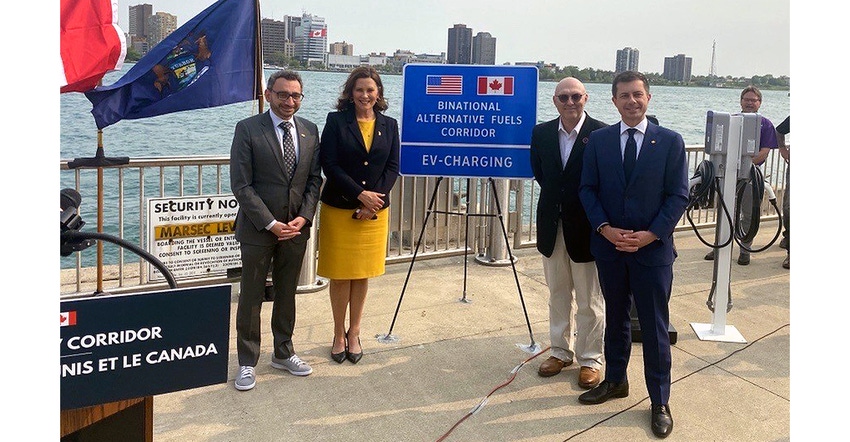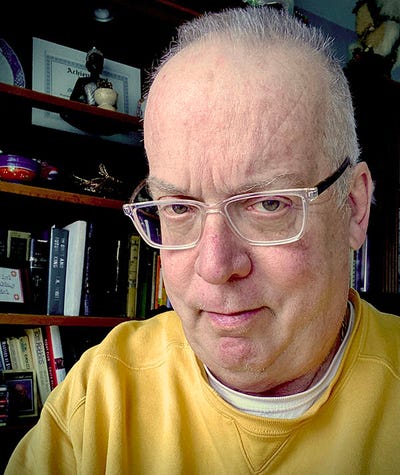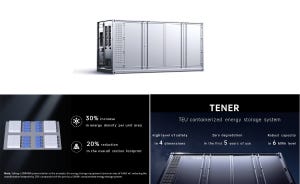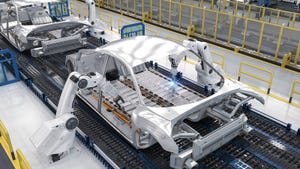Kalamazoo-to-Quebec corridor is expected to be the first of many shared by the neighboring nations.
June 1, 2023

EV charging in the US is planning to shake hands with Canada. On May 16, U.S. Transportation Secretary Pete Buttigieg joined Canadian Minister of Transport Omar Alghabra, Michigan Governor Gretchen Whitmer, Detroit Mayor Mike Duggan, and other leaders in announcing the first binational electric vehicle (EV) charging corridor between the two countries. Starting in Kalamazoo, MI, the newest EV corridor will stretch to Quebec City, Quebec, with DC fast chargers approximately every 50 miles (80 km). From Kalamazoo, the charging route will cover US Highway I-94 through the Detroit tunnel to Canada; Highway 401 through Toronto, Highway 20 to Montreal, and Highway 40 through Quebec City.
Interdepartmental cooperation in the US
The announcement is the latest culmination of several US government agencies coordinating their efforts. In February, the Department of Transportation, in partnership with the Department of Energy, finalized new EV charging network standards to ensure everyone can use the network, no matter what make of EV one drives. These standards “will direct federal dollars to build out a national EV charging network that is user-friendly, reliable, and accessible so that charging is as easy as filling up at a gas station,” according to a February White House announcement.
In addition, the Federal Highway Administration (FHWA) has shared plans for the Charging and Fueling Infrastructure (CFI) discretionary grant program that is making more than $2.5 billion available over five years for infrastructure building—including $700 million through the first round of funding—for deploying publicly accessible charging in communities across the country, “including at schools, grocery stores, parks, libraries, apartment complexes, and everywhere else Americans live and work.”
International cooperation of North American neighbors
All these efforts and more are being harmonized with Canada and form the first of many planned corridors between the two nations. “The US and Canada have long enjoyed a productive partnership on transportation issues and in that spirit, we are proud to announce the first-ever US-Canada EV Corridor,” stated US Transportation Secretary Pete Buttigieg. “With historic investments in EV infrastructure from the Biden-Harris Administration and the Canadian government, we are creating a new generation of good-paying manufacturing jobs, making it possible for drivers everywhere to reap the benefits and savings of these vehicles while helping us fight climate change.”
Canada Transport Minister Alghabra stated, “Canada and the United States have built the world's largest market-based energy trading relationship, which provides a firm foundation as we strive to reach net-zero greenhouse gas emissions, This first cross-border alternative fuel corridor will help drivers to travel across the border and charge or refuel worry-free.”
In Canada, one in ten new vehicles purchased is already a zero-emission vehicle. Not only does the Binational EV Corridor facilitate the movement of passengers and goods through this key economic binational corridor; it also helps Canada to achieve net-zero greenhouse gas emissions by 2050.
“Today's announcement of the first US Binational EV Corridor is a huge step into the future of zero-emissions transportation and commerce,” stated Detroit Mayor Mike Duggan. “This corridor will carry the flow of EV traffic, trade, and manufacturing between the United States and Canada, through Detroit's international crossing with Windsor. We owe our thanks to Sec. Buttigieg for his vision and President Biden for making this advancement possible through the Bipartisan Infrastructure Law.”
The Bipartisan Infrastructure Law alone includes $7.5 billion in federal funding to help build a US network of 500,000 public EV chargers and a number of alternative fuel corridors. Together with the CHIPS Act and Inflation Reduction Act, major funding and support is in place for the goal of having 50 percent of all new vehicle sales in the U.S. be electric by 2030.
About the Author(s)
You May Also Like





